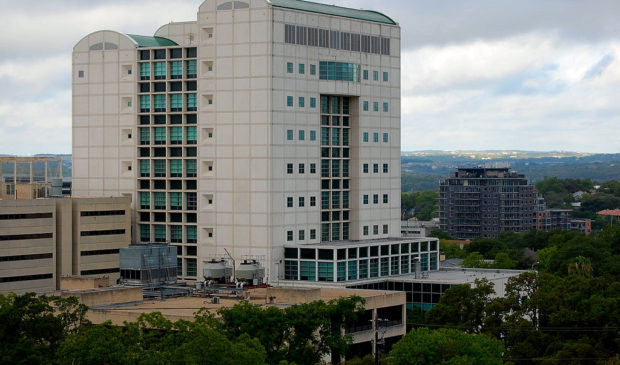County criminal courts ask for more judges
Wednesday, October 19, 2016 by
Caleb Pritchard The Travis County Criminal Courts system is in need of expanding, according to top officials.
Presiding Judge Brenda Kennedy and several of her colleagues officially made the request before County Judge Sarah Eckhardt and the Commissioners Court on Tuesday.
All told, Kennedy asked for three new district courts to supplement her current stable of nine.
The need, explained Debra Hale, director of the Criminal Courts administration, is determined by a complex formula established at the behest of the Texas Legislature.
The state Office of Court Administration’s matrix factors in case filings as well as how many hours per year a judge hears those cases, is engaged in administrative duties, takes allotted vacations and participates in continuing legal education, among other activities. Plugging in Travis County’s variables produces an outcome that shows a deficit of three judges, Hale said.
Judge Julie Kocurek pointed out that the statistics used in factoring that number could be called into question. She said a state survey in 2007 that assigned weighted times for each category of case determined that Texas judges spend an average of 186 minutes total on certain felonies, including capital murder, murder, aggravated assault and sexual assault.
“Having presided over many murder and capital murder cases – and I’m sure the commissioners know because of the amount of money that we spend on those types of cases – the trial itself lasts a month. Jury selection in itself is two weeks,” Kocurek said.
She explained that new requirements under the Michael Morton Act, which reformed the discovery process, have also extended the life cycles of certain criminal cases.
Commissioner Gerald Daugherty expressed doubt about the findings of the Office of Court Administration’s formula if incorrect or outdated hours of cases were used as inputs. Eckhardt, however, defended the outcomes.
“It’s the average statewide,” she said. “And the point here is the Office of Court Administration is rather conservative in its view of how much time it takes to dispose of these cases. So if OCA is saying, ‘Y’all need more courts,’ it’s likely that we need more courts.”
Daugherty also questioned the judges’ argument that caseloads are increasing in part due to an increase in violent crimes.
“When you listen to the police chief, when you listen to law enforcement, I mean, violent crime is substantially down, is what the information is on the street,” said Daugherty.
Kennedy conceded that murder rates may be slipping, but other crimes such as aggravated robberies, assaults, family violence and indecency against children are on the rise.
Judge David Crain speculated that increased awareness and willingness to report such crimes may be behind the increase in cases of indecency against children. The Legislature also recently expanded the scope of felony family violence to include strangulation, Crain said, which could also explain the surge in those cases.
Sensing the conversation veering off track, Eckhardt cautioned against drawing any conclusions about safety in the community based on the Criminal Courts System’s assessment of its needs. “Statistics don’t lie, but what stories you draw from them are sometimes inaccurate,” she said.
Last week, the Commissioners Court heard a similar request for new judgeships from the Civil and Family Courts. That plea is far more problematic for county planners due to the overcrowding at the 85-year-old Heman Marion Sweatt Courthouse, which houses the civil courts. In contrast, the Blackwell-Thurman Criminal Justice Complex, where the county’s criminal courts are located, was opened in 2001. Furthermore, the District Attorney’s Office will soon vacate the adjacent Gault Building for the upcoming Ronnie Earle Building across the street, freeing up space for the new courts.
On Tuesday, the Commissioners Court took no action on the request. Ultimately, the Legislature will decide during its session next year whether to create the courts. According to Kennedy’s preferred time table, the first two courts would open by 2019 and the third in 2021. Including the relevant supporting staff, each court would cost an estimated $1.5 million to operate annually.
The Austin Monitor’s work is made possible by donations from the community. Though our reporting covers donors from time to time, we are careful to keep business and editorial efforts separate while maintaining transparency. A complete list of donors is available here, and our code of ethics is explained here.
You're a community leader
And we’re honored you look to us for serious, in-depth news. You know a strong community needs local and dedicated watchdog reporting. We’re here for you and that won’t change. Now will you take the powerful next step and support our nonprofit news organization?









